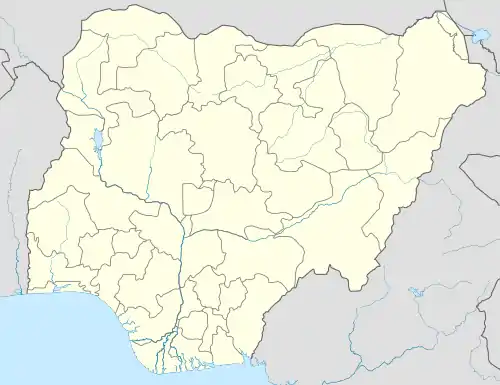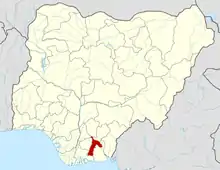Arochukwu
Arochukwu, sometimes referred to as Arochuku or Aro Oke-Igbo, is the third largest city in Abia State (after Aba and Umuahia) in southeastern Nigeria and homeland of the Igbo subgroup, Aro people.
Arochukwu
Aro Oke-Igbo | |
|---|---|
City | |
 Arochukwu Location of Arochukwu in Nigeria | |
| Coordinates: 5°23′N 7°55′E | |
| Country | |
| State | Abia State |
| Composition | 19 villages |
| Government | |
| • Type | Monarchy (One of the few Igbo kingdoms in Nigeria, which practices the monarchical system of government) |
| • Eze Aro | Ogbonnaya Okoro[1] |
| Area | |
| • Total | 202 sq mi (524 km2) |
| Population | |
| • Ethnicities | Igbo |
| • Religions | Christianity Traditional religions |
| 3-digit postal code prefix | 442 |
| ISO 3166 code | NG.AB.AR |
It is composed of 19 villages with an overall leader called Eze Aro. Arochukwu is a principal historic town in Igbo land. It was also one of the cities in the Southern protectorate targeted by the British colonial government. Several historic tourist sites exist in the city. The mystic Ibini Ukpabi shrine, the slave routes and other relics of the slave trade era are frequently visited by tourists. It is also in the food belt of Abia state where most of the staple foods are produced.
History
Arochukwu was home to a clan of the Ibibios, they founded the early states of Obong Okon Ita and Ibom. Many years passed,slaves and outsiders that had settled in rebelled over the reign of the ruling clan chief in connivance with the younger brother of the ruling family. The first Igbo group was the Ezeagwu group led by their leader Agwu Inobia. As Aro-Ibibio wars occurred, there was a stalemate. In reaction, the Eze Agwu clan invited a priest named Nnachi from the Edda clan of northeastern Igboland and another group from the east of the Cross River through Nnachi. These people were identified as the Akpa people. Akpa forces led by Osim and Akuma Nnubi, they helped the rebellious group capture the rest of the area. This formed the alliance of 19 new and old states in the area known as the Arochukwu kingdom around 1650–1700. The first king (or Eze Aro) of a unified Arochukwu was Akuma but after his death, Nnachi son's Oke Nnachi took over and his descendants have the throne to this day.
By the mid-18th century, Arochukwu people founded many other communities both within and outside Igboland.[2][3] These migrations, influence of their god Ibini Ukpabi through priests, and their military power backed up by alliances with several related neighboring Igbo and eastern Cross River militarized states (particularly Ohafia, Abam, Abiriba, Afikpo, Ekoi, etc.) quickly established the Aro Confederacy as a regional economic power. However, Aro economic hegemony was threatened by the penetration of Europeans, mainly British colonists in the wake of the 20th century. Tensions finally led to bloodshed and the Anglo-Aro War took place from 1901 to 1902. The Aro Confederacy stoutly resisted but were eventually defeated. This helped the British to occupy the rest of what is now known as Eastern Nigeria.
Demography
The kingdom is Igbo mixed with Ibibio and Akpa. The main language in Arochukwu is Igbo while Ibibio is also spoken.
The population of Arochukwu town is 10,776.[4] The local government area had a population of 193,820 in 2011, up from 97,800 in 1991.[5]
Etymology
Aro translates as Children and Chukwu as God. Put together this could imply Children of God. [7]
Notable people
- Mazi Alvan Ikoku, OBE educationist (1900–1971)
- Nwankwo Kanu, footballer
- Chidi Imoh, athlete
- Alexx Ekubo, Actor and Model
- Nnamdi Udoh, aeronautic engineer
- Margaret Manson Graham (1860-1933), Scottish missionary nurse who died at Arochukwu
- Mao Ohuabunwa, Industrialist and Politician
- Mazi Benjamin Okike, First Nigerian Professor of Information Encryption[8]
References
- Nwogu, Mathas (August 19, 2009). "Aro Kingdom re-brands after 700 years". The Sun Publishing LTD. Retrieved 2010-02-25.
- Afigbo, AE. Groundwork of Igbo History. Lagos, Vista Books Limited, 1992
- Onwuejeogwu, MA. Igbo civilization: Nri kingdom and hegemony; London, Ethnographica, 1981
- "Archived copy". Archived from the original on 2016-08-21. Retrieved 2016-07-16.CS1 maint: archived copy as title (link)
- listing of city populations for Nigeria
- "Nigeria - Languages". Ethnologue, 22d edition. Feb 2019.
- Mazi A. Kanu Oji.: Corruption in Nigeria: The fight and movement to cure the malady - University Press of America, Landham, MD. ISBN 978-0-7618-5217-9
- Aro, Ikeji. "The plight of a university don, his accident and abandonment by employer". Newsexpress.com. News Express. Retrieved 13 September 2020.
